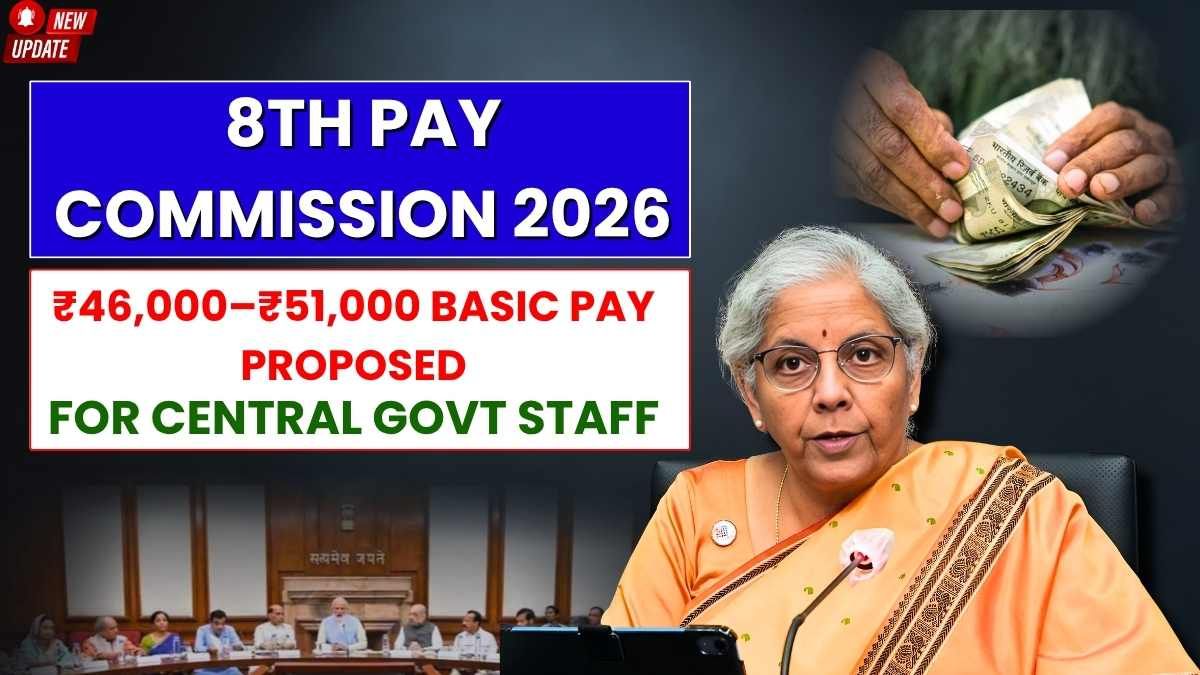The Central Government employees are closely watching the developments around the 8th Pay Commission, expected to bring a major salary revision in 2026. Early discussions and reports suggest that the minimum basic pay may rise to between ₹46,000 and ₹51,000, depending on the final recommendations.
Here’s everything you need to know about what’s being proposed, when it might be implemented, and how it could impact government employees across India.
When Will the 8th Pay Commission Be Implemented?
As of now, the 8th Central Pay Commission (8th CPC) is expected to be constituted in 2025, with recommendations likely coming into effect from January 1, 2026.
The 7th Pay Commission has been in place since January 2016, and following the 10-year cycle, the next revision is due in 2026. The government is currently reviewing inflation, DA (Dearness Allowance) hikes, and fiscal factors before officially announcing the new commission.
If the usual timeline is followed, employees can expect the formal 8th CPC notification by mid-2025 and the implementation by early 2026.
How Much Salary Hike Can Employees Expect?
According to early estimates, the minimum basic pay could increase from ₹18,000 (7th CPC) to around ₹46,000–₹51,000 under the 8th CPC.
The fitment factor, which determines the overall salary increase, is expected to rise from 2.57x (7th CPC) to somewhere around 3.68x to 3.80x. This would lead to a 40% to 45% overall hike in basic pay for central government employees.
| Pay Commission | Year Implemented | Fitment Factor | Minimum Basic Pay |
|---|---|---|---|
| 6th CPC | 2006 | 1.86x | ₹7,000 |
| 7th CPC | 2016 | 2.57x | ₹18,000 |
| 8th CPC (Expected) | 2026 | 3.68x–3.80x | ₹46,000–₹51,000 |
This would also mean significant increases in HRA (House Rent Allowance), DA, TA (Transport Allowance), and other benefits that are calculated as a percentage of the basic pay.
Why Is There a Demand for the 8th Pay Commission Now?
The demand for the 8th CPC has grown stronger in 2024–2025 due to several reasons:
- Rising Inflation: The cost of living has increased significantly since the 7th CPC was implemented.
- DA Ceiling Pressure: The current DA rate is nearing 50%, triggering an automatic revision of allowances.
- Pay Gap Concerns: There’s an increasing disparity between central employees and PSU/private sector workers.
- Economic Growth: The government’s improved fiscal position post-pandemic has created room for a wage revision.
Employee unions have been actively requesting that the government announce the 8th CPC early to ensure a smooth transition by 2026.
What Benefits Will Come With the 8th Pay Commission?
The 8th CPC is expected to revise not just the basic pay, but also several allowances and benefits tied to it.
Here’s what employees can expect once it takes effect:
- Higher Basic Pay: Likely increase of 2.5 to 3 times current levels.
- Revised Allowances: HRA, TA, Medical, and Children’s Education Allowance to rise proportionally.
- Increased Pension: For retired employees, pensions will automatically adjust based on the new pay matrix.
- Improved DA Structure: DA will restart from 0% after implementation and rise twice a year as per inflation.
- Higher Gratuity and Retirement Benefits: All post-retirement payouts will be recalculated on the revised pay scale.
This means a substantial improvement in take-home salary, retirement corpus, and overall job satisfaction for nearly 50 lakh central government employees and 70 lakh pensioners.
How Will the Fitment Factor Impact Salaries?
The fitment factor plays a crucial role in determining the salary increase under any Pay Commission. It’s the multiplier used to convert the current basic pay into the new pay level.
For example:
If your current basic pay is ₹30,000 and the 8th CPC fitment factor is 3.68, your new basic pay would be:
₹30,000 × 3.68 = ₹1,10,400
This base figure then determines all other components like DA, HRA, and TA, resulting in a much higher overall package.
Where Does the Proposal Stand Right Now?
As of late 2025, the government has not officially announced the formation of the 8th Pay Commission, but multiple reports and internal discussions indicate it’s on the way.
The Department of Expenditure is studying the fiscal implications, while employee unions continue to press for early approval. There’s also speculation that the Union Budget 2026 may include key announcements related to pay structure changes.
Conclusion
The 8th Pay Commission promises a major boost to central government salaries, with the minimum basic pay expected between ₹46,000 and ₹51,000. The revision could benefit millions of employees and pensioners, ensuring pay levels keep pace with inflation and living costs.
While the government is yet to issue an official notification, preparations are clearly underway. If implemented as projected in January 2026, it will mark one of the most significant salary upgrades in recent years.
FAQs
When will the 8th Pay Commission be implemented?
It is expected to be implemented from January 1, 2026, following government approval in 2025.
What is the proposed minimum basic pay under the 8th CPC?
Reports suggest the minimum basic pay could range between ₹46,000 and ₹51,000.
Will pensioners benefit from the 8th CPC?
Yes. Pension and retirement benefits will be revised according to the new pay matrix once implemented.



